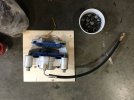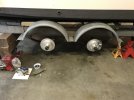seahorse
Crew Member
I would like to get expert opinions from forum members on trailer bearings. My first trip to Port Hardy this season leaving from Courtenay last Thursday and I blew a set of one year old bearings. Had to fix at roadside south of Campbell River 20 minutes from my house. I installed all new Titan rotors, bearings, calipers etc last February. Got back on the road with the help of my son in law and his mechanic and rolled into Port Hardy at 10:30 pm. Up at 5am, drive to the Bear Cove launch and blow another set of bearings and toast the rotor this time as well. Spent Friday afternoon replacing the rotor and bearings in the second axle. So just wandering what everyone else does for maintenance? Do you pull the rotors every spring religiously and repack? Or just pump more grease into the bearing buddies? Or only buy American or Canadian made bearings and boycott the Chinese crap? We did well fishing but the bearing issue really pissed me off and not sure what I should have done different. The trailer is a tandem axle 2013 Road Runner , I appreciate your insight, thanks, Don



